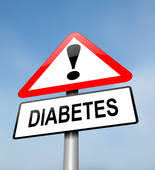By Chef K.T. Murphy
 Diabetes is a condition in which the body either doesn’t make enough insulin – the hormone responsible for controlling blood sugar levels – or doesn’t respond well to insulin. As a result, blood sugar levels rise, which, in turn, may have a broad range of negative effects on the body.
Diabetes is a condition in which the body either doesn’t make enough insulin – the hormone responsible for controlling blood sugar levels – or doesn’t respond well to insulin. As a result, blood sugar levels rise, which, in turn, may have a broad range of negative effects on the body.
According to the National Institute of Diabetes and Digestive and Kidney Diseases, about 30.3 million people have diabetes in the United States. While the condition can be managed with a combination of medication and lifestyle changes, if left untreated, it may have a negative impact on the person’s health over time.
Among the consequences of type 2 diabetes are:
Diabetic heart disease
One of the most common negative effects of type 2 diabetes on the body is damage to the blood vessels. This is the cause of many diabetes-related conditions. In fact, a person with diabetes is at a higher risk of heart attacks and strokes than people who don’t have diabetes.
Diabetic heart disease includes a few conditions:
• Coronary heart disease. It refers to the buildup of plaque – fat and other waste materials – inside the arteries, hardening and even blocking them over time. When the arteries are blocked, your heart may not receive oxygen-rich blood, which causes angina, or chest pain. If you’re experiencing angina, you may feel a tightening or squeezing in your chest that goes away with rest. Over time, coronary heart disease may cause heart failure.
• Diabetic cardiomyopathy. Another serious consequence of type 2 diabetes is diabetic cardiomyopathy, which damages the heart and may also cause arrhythmia and heart failure. Unlike coronary heart disease, diabetic cardiomyopathy may go unnoticed in its early stages. Over time, you might notice weakness, fatigue, and swelling of your legs.
Eyes

Diabetes causes damage to blood vessels all over the body, including the eyes. According to WebMD, diabetes is the main cause of vision loss in adults in the United States.
Patients with type 2 diabetes are prone to developing diabetic eye disease. It is a group of eye-related conditions people with diabetes are at an increased risk of developing, which may result in vision loss.
Some of the most common eye conditions related to diabetes are:
• Glaucoma. It is the damage to the nerves and retina due to a pressure buildup inside the eye. Over time, it may cause vision loss. Type 2 diabetes increases the risk of suffering from glaucoma in 40%, and the risk increases even more with age. However -and according to the Glaucoma Research Foundation -, the exact relationship between diabetes and glaucoma is not yet known, and research is underway to discover the exact mechanisms in which diabetes affects the eye leading to glaucoma
• Cataracts. Another serious eye condition diabetes patients need to monitor is cataracts. With cataracts, clouding in the eye’s lens blocks light and makes vision blurry. In fact, the American Diabetes Association estimates that type 2 diabetes increases the chances of developing cataracts in 60%, and diabetes patients tend to develop them at an earlier age.
• Diabetic retinopathy. Another condition included in diabetic eye disease is diabetic retinopathy. It is the result of damage to the blood vessels in the eye. Over time, capillaries in the eye may become blocked and form pouches and scar tissue, and cause bleeding.
Kidneys
Type 2 diabetes puts the kidneys under increased pressure. As high blood sugar levels damage the blood vessels in the kidneys, the kidneys become less efficient in filtering waste from your blood. According to the National Kidney Foundation, up to 40% of type 2 diabetes patients develop kidney failure. Kidney failure often goes unnoticed in its early stages, which makes it harder to detect. As it progresses, it may cause swelling in the legs and feet.
Adequate management of diabetes through a healthy diet, medication, and lifestyle changes, may help delaying or preventing these conditions. When it dought get it checked out. It is so Important to have minuium check up with your doctor. Diabetes is an issue that is close to my heart. My Mother passed from having Diabetes after loosing her legs arm and eyes site. from a simple trip in the snow. She lived with this from a yound lady of age 17 that was in a car accident to her late 60’s. I get checked with my yearly check up.
All the best
Chef Murph
XoxoX

